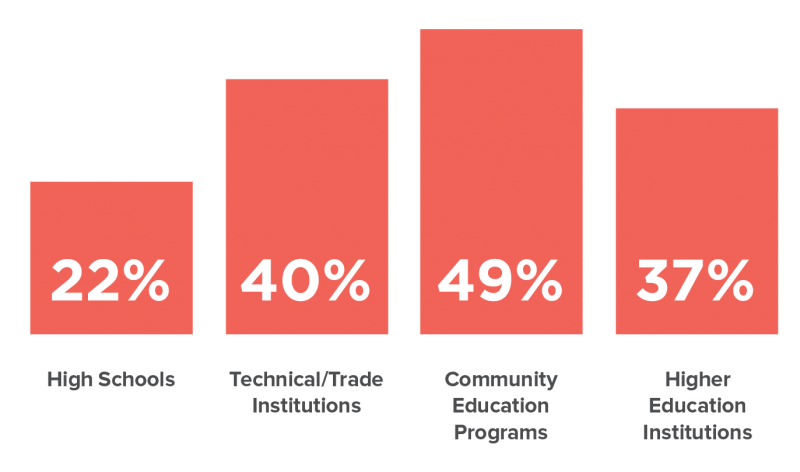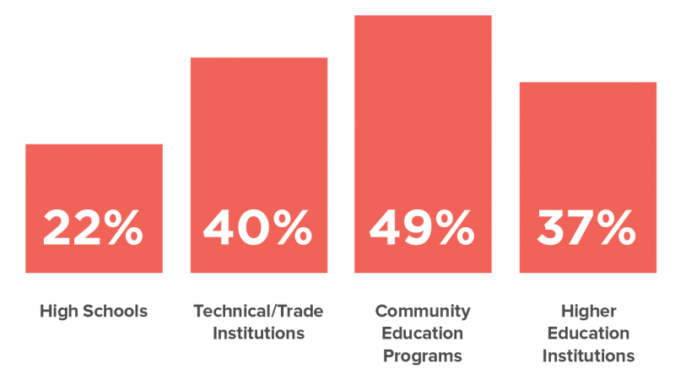Employers and hiring managers are preparing for a world where competencies – not degrees – are the most important factors when filling a job, according to a new report by the U.S. Chamber of Commerce Foundation called, “Hiring in the Modern Talent Marketplace.” The findings also show that employers value their work with higher education to align what is taught in the classroom with the needs of the economy.
The study surveyed 500 hiring managers, and respondents acknowledged the need to overhaul their hiring practices to focus on competencies over formal education credentials. Nearly three-quarters (74%) of respondents agreed that there has been a lack of skilled talent among the available workforce in recent years.
The top three goals for hiring managers in 2020 reflect this challenge:
- Retain more talent (41%)
- Recruit top talent (35%), and
- Reduce the time to hire new talent (26%).
Though advances in technology are rapidly changing the skills needs of the business community, more than half (58%) of respondents believe automation is an opportunity and will likely create the same number of new roles in the workforce as those it eliminates.
“As a nation, we need to move toward a skills-based approach for educating and hiring where the skills taught in the classroom directly align to the skills required for a career,” says Cheryl Oldham, senior vice president of the U.S. Chamber of Commerce Foundation’s Center for Education and Workforce. “This research affirms the strategic need for the Chamber Foundation’s core workforce projects – Talent Pipeline Management® (TPM), the Job Data Exchange™, and the T3 Innovation Network™ – which are focused on helping businesses address this very hiring challenge.”
Decision makers expect to adjust their recruitment practices as competencies become a primary factor in hiring. More than three-quarters of respondents (78%) agree that they will need to reassess the way they hire, and nearly half (45%) report that changing hiring processes is a priority in their organization.
These findings show that competencies, defined as knowledge and skills that can be observed, measured, or otherwise assessed, are more important to organizations than formal education credentials. Three quarters of respondents (74%) report that their company requires the submission of a credential in their hiring practices, but only one quarter (26%) claim the credential is used in assessing the candidate’s viability.
The study found the top three potential solutions to fix the skills gap are:
- Increasing upskilling initiatives for current employees
- Working with educational programs (i.e. partner programs with local schools, postsecondary partnerships, etc.) to strengthen talent pipelines
- Improving alignment between educational program curricula and the skills needed in the workforce
Respondents view partnerships with the education community as a way to provide talent with in-demand skills. Hiring managers are working with community education institutions, such as community colleges (49%), technical or trade institutions (40%), and higher education institutions, such as college bachelor’s programs or master’s programs (37%).
PartnershipsTable.png

Of respondents who indicated that their organization works with these education institutions to source talent, two-thirds (65%) say those relationships are extremely or very effective at providing talent to their corporations, and maintaining or improving those relationships is a priority to a majority (61%) of their companies.
To read the full report, visit: https://www.uschamberfoundation.org/reports/hiring-modern-talent-marketplace
This report is based on a survey conducted from November 20-27, 2019 and was commissioned by the U.S. Chamber of Commerce Foundation with respondents sourced from Cint. The objective was to better understand the current hiring landscape. The survey was of 500 U.S. HR hiring decision makers. The margin of error is +/- 4.4 percentage points.
The U.S. Chamber of Commerce Foundation is dedicated to strengthening America’s long-term competitiveness. We educate the public on the conditions necessary for business and communities to thrive, how business positively impacts communities, and emerging issues and creative solutions that will shape the future. Our workforce development portfolio is transforming employer engagement in education partnerships, connecting workers with real pathways to the jobs that employers are trying to fill.
The U.S. Chamber of Commerce is the world’s largest business federation representing the interests of more than three million businesses of all sizes, sectors, and regions, as well as state and local chambers and industry associations.

